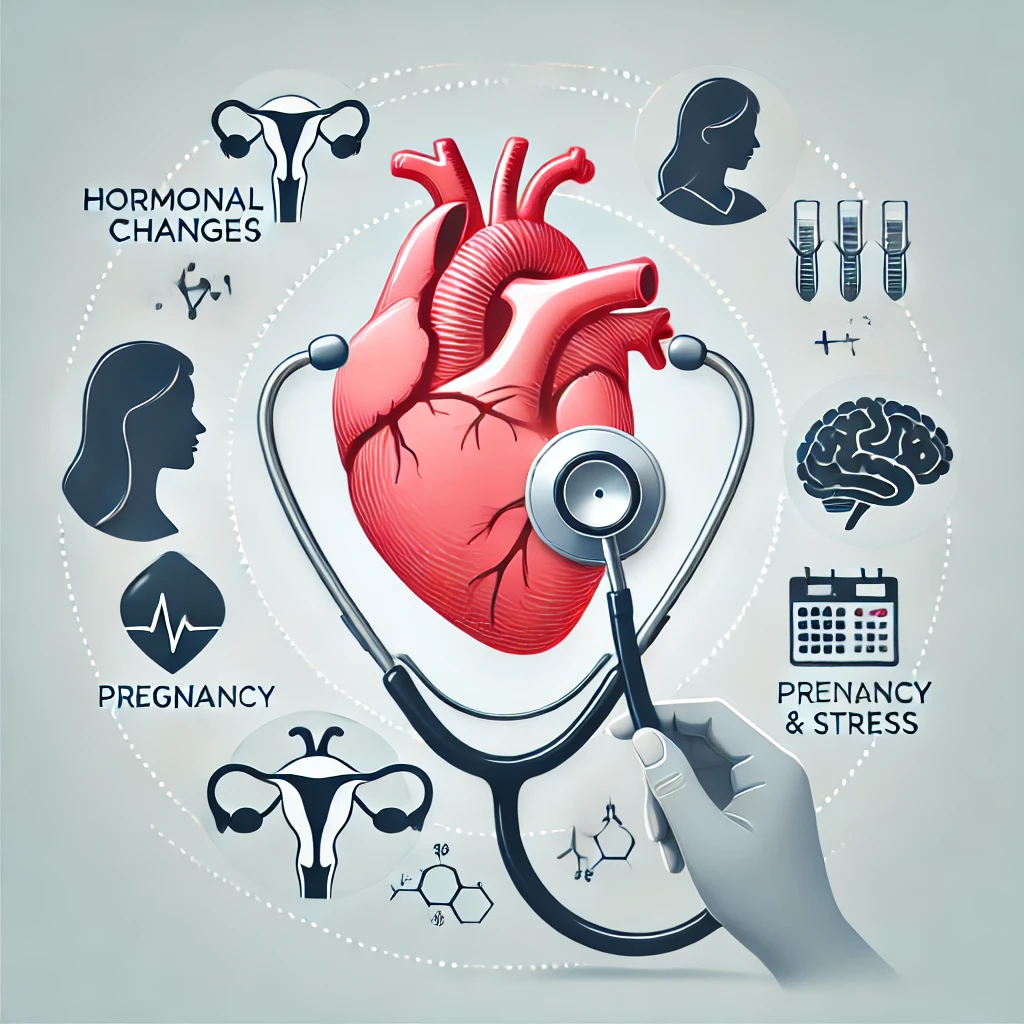When we think about heart disease, most of us picture it affecting middle-aged men. But here’s something we need to talk about more—heart disease is the leading cause of death among women in India, and many aren’t aware of their unique risk factors. As a cardiologist, I’ve seen women come in with heart disease symptoms that were misdiagnosed or ignored because their risks are less well-known. Unlike men, women face unique heart health challenges that are influenced by hormones, pregnancy, autoimmune diseases, and even mental health. Let’s break down these unique factors so that you can take control of your heart health.
The Impact of Hormonal Changes on Women’s Heart Health
We all know hormones play a huge role in women’s health, but did you know they affect heart health too? Estrogen, which is present in higher levels before menopause, actually protects the heart by keeping blood vessels flexible and healthy. But once women hit menopause, those estrogen levels drop significantly, and that’s when the risk of heart disease starts to climb.
What I often see in my female patients is that they don’t realize this change is happening. Menopause brings about many symptoms—hot flashes, mood changes, etc.—but heart disease isn’t usually top of mind. However, post-menopausal women have an increased risk of heart disease, especially if they have other risk factors like diabetes or high cholesterol.
Now, there’s been some talk about hormone replacement therapy (HRT) being a solution for heart health, but it’s a double-edged sword. While HRT can help relieve menopausal symptoms, studies show it may slightly increase the risk of cardiovascular disease, especially if started later in life. So, if you’re considering HRT, it’s essential to discuss this with your doctor, weighing the benefits and risks carefully.
For younger women dealing with conditions like Polycystic Ovary Syndrome (PCOS), the risks are also real. PCOS is linked with insulin resistance, obesity, and high blood pressure, all of which increase your risk for heart disease. The earlier we start managing these conditions, the better we can protect your heart in the long run.
Pregnancy-Related Complications and Heart Disease Risks
Pregnancy is a special time, but it also places extra strain on a woman’s heart. Some pregnancy-related complications can increase the risk of developing heart disease later in life. For example, women who experience gestational diabetes or preeclampsia (high blood pressure during pregnancy) are at a much higher risk of heart disease.
I’ve had patients who felt fine after childbirth but were unaware that these pregnancy complications put them at risk long-term. Preeclampsia, for instance, can double the risk of heart disease or stroke years after the baby is born. Similarly, gestational diabetes not only increases your chances of developing type 2 diabetes but also adds to your cardiovascular risk.
Another condition to watch out for is postpartum cardiomyopathy, which can occur right after delivery. Though rare, it’s a form of heart failure that can happen even to women without any prior heart conditions. The scary part is that the symptoms—shortness of breath, swelling in the legs, or feeling unusually fatigued—are often mistaken for regular postpartum exhaustion. If you experience any of these signs after pregnancy, it’s important to get checked out by a doctor right away.
Autoimmune Diseases and Heart Health in Women
Autoimmune diseases like lupus and rheumatoid arthritis disproportionately affect women, and they come with a hidden heart risk. These conditions cause chronic inflammation in the body, which over time damages the blood vessels and increases the chances of developing heart disease.
In my practice, I see a higher rate of heart complications in women with autoimmune diseases. What’s frustrating is that most people are unaware of this connection. So, if you’re dealing with an autoimmune disease, you need to be proactive about your heart health. Regular screenings and close monitoring are key to catching any cardiovascular issues early on.
The Role of Stress and Mental Health
Stress and mental health challenges are significant but often overlooked factors in heart disease, especially for women. Chronic stress, whether from work, family pressures, or caregiving roles, takes a serious toll on the heart. It’s no secret that women often bear the brunt of caregiving responsibilities in Indian families, juggling multiple roles that can be overwhelming.
Studies show that women who experience high levels of stress or depression are more likely to develop heart disease. Unlike men, who may show more “classic” heart attack symptoms, women’s stress-related heart issues often present differently—fatigue, indigestion, or even just feeling “off.” Unfortunately, these symptoms can be dismissed as non-cardiac, leading to delayed diagnosis and treatment.
Lifestyle Factors that Put Women at Greater Risk
While lifestyle factors like smoking, obesity, and inactivity are harmful to everyone, they affect women in different ways. For example, research shows that smoking increases a woman’s risk of heart disease even more than it does for men. Yet, the number of women smoking in India is rising, especially in younger age groups.
Obesity and inactivity are also major concerns. With the rise of sedentary jobs and easy access to processed foods, women are increasingly becoming prone to weight gain, which directly impacts their heart. Coupled with cultural expectations that often discourage women from prioritizing their own health, these lifestyle factors can set the stage for heart disease down the line.
Protecting Your Heart: What Can Women Do?
The first and most crucial step is awareness. If you’ve experienced any of the risks I mentioned—whether it’s due to pregnancy complications, hormonal changes, or an autoimmune disease—it’s important to discuss this with your doctor and get regular heart health screenings.
Leading a heart-healthy lifestyle is non-negotiable. This means eating a balanced diet rich in fruits, vegetables, and whole grains, and getting regular exercise. Even if you’re short on time, activities like walking, yoga, or simple stretches at home can make a huge difference. Also, don’t ignore the impact of stress on your heart. Prioritize mental wellness by finding ways to relax—whether it’s meditation, spending time with loved ones, or just taking a break.
Finally, I encourage all women to advocate for their own health. Don’t hesitate to ask questions, seek second opinions, or push for further testing if you feel something is wrong. Heart disease may be a silent killer, but with the right knowledge and proactive steps, we can beat it.
Conclusion
As women in India face the growing dual burden of traditional expectations and modern stress, it’s crucial to be aware of these unique heart disease risk factors. Hormonal changes, pregnancy complications, autoimmune diseases, and lifestyle factors are just a few of the challenges. But here’s the good news—by taking control of your health today, you can drastically reduce your risk of heart disease tomorrow. Start by getting regular screenings, maintaining a healthy lifestyle, and managing stress. It’s time for women to prioritize their hearts—because your heart deserves just as much care as the rest of you!



